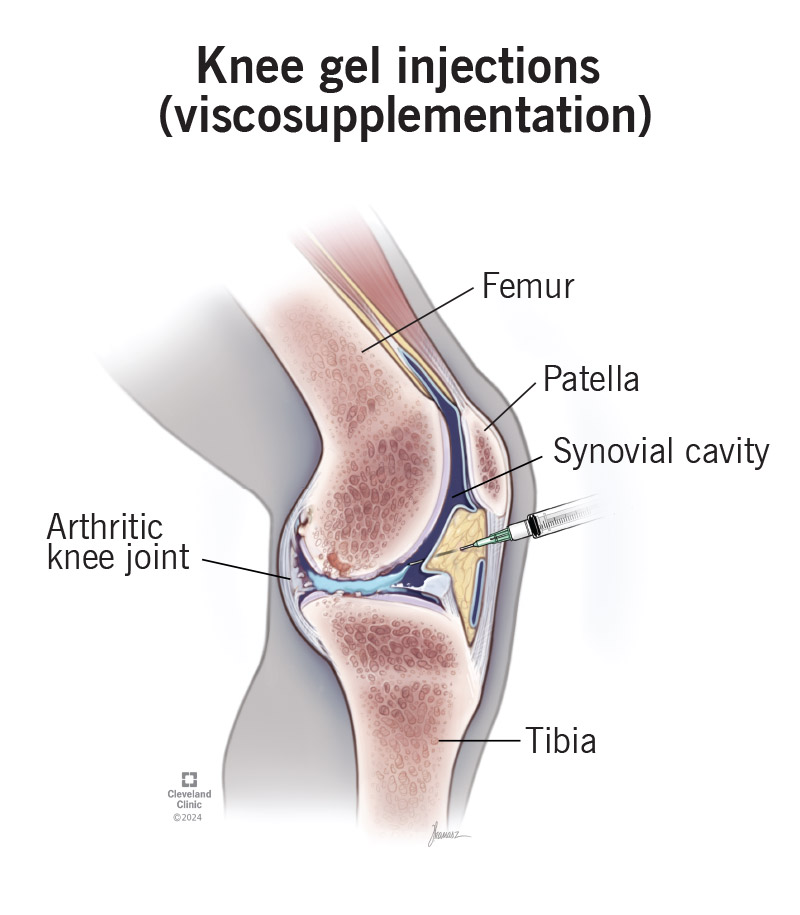Knee gel injections are injections of hyaluronic acid, a viscous substance found naturally in your joints. Gel injections can help replace the lost lubrication in your knee joint when you have arthritis. Healthcare providers call this viscosupplementation.
Advertisement
Cleveland Clinic is a non-profit academic medical center. Advertising on our site helps support our mission. We do not endorse non-Cleveland Clinic products or services. Policy

Image content: This image is available to view online.
View image online (https://my.clevelandclinic.org/-/scassets/images/org/health/articles/knee-gel-injections-viscosupplementation)
Knee gel injections are a treatment for arthritis in your knee joint. Technically, they’re hyaluronic acid injections. Hyaluronic acid is a natural lubricant found in many of your body’s tissues. It’s also the main ingredient in synovial fluid, which lubricates your joints. It has a viscous quality — thick and gel-like.
Advertisement
Cleveland Clinic is a non-profit academic medical center. Advertising on our site helps support our mission. We do not endorse non-Cleveland Clinic products or services. Policy
Arthritis in your knee reduces the synovial fluid in your joint, along with your cartilage. This contributes to the joint pain you feel when you move your knee. Injections of hyaluronic acid gel can help replace the lubrication you’ve lost and ease your knee pain. Healthcare providers call this viscosupplementation.
Viscosupplementation injections are currently only FDA-approved to treat arthritis of the knee. The FDA hasn’t found enough evidence to recommend it for treating other joints. However, some healthcare providers do offer it as a treatment option, and some people do get gel injections in their other joints.
Treating knee arthritis pain requires a multi-pronged approach. Healthcare providers usually recommend starting with first-line treatments for arthritis of the knee before moving on to injections. When these treatments aren’t quite doing enough, knee injections can offer an extra boost of relief.
First-line treatments for osteoarthritis of the knee include:
Injection therapy is a second-line treatment for arthritis. Types of injections include:
Advertisement
You can get knee gel injections in your healthcare provider’s office. Your provider will:
You can go home right after the procedure. Some people have mild pain or swelling at the injection site. If you do, apply ice (wrapped in a towel) and it should go away shortly. Avoid using your knee too heavily for the next 48 hours. Light walking is okay, but don’t overuse it or put too much weight on it.
It might take a few shots in a row to begin to feel the benefits of knee gel injections. Most people get a shot every week for three to five weeks in a row. Once you start to feel relief, it can last for months. This varies among people, but most can go about six months before needing a new dose.
It’s safe to get knee gel shots repeatedly for as long as you need. Frequent use won’t make them start to work less or raise your risk of side effects, as it can with cortisone shots. But they may start to help less as your arthritis progresses. People with advanced arthritis might need to consider other treatments.
Hyaluronic acid is a lubricant for your knee. Injections into the joint (intra-articular injections) can replace the synovial fluid you’ve lost to help cushion your knee joint. Some studies have found that hyaluronic acid might also be chondroprotective, meaning it might slow down the progress of arthritis.
The most common side effect is mild pain and swelling at the injection site that goes away on its own. About 1% of people have a more severe reaction called an injection flare. It causes fluid to accumulate in the joint, with significant swelling and pain. Your provider can draw out the fluid to relieve it.
Gel shots may be better for you than cortisone shots if you have health conditions related to high blood pressure or high blood sugar. Cortisone shots can cause these levels to spike. Cortisone shots also have more serious potential side effects than gel shots. Although rare, the risks increase with repeated use.
Cortisone shots usually work faster and more consistently than gel shots to relieve knee pain. Gel shots don’t work for everyone, and when they do, they can take a few weeks to kick in. Cortisone shots kick in more immediately, but they only last a few months. Gel injections last an average of six months.
Advertisement
You and your healthcare provider will observe how well knee gel injections work for you. If they do bring relief, you might find they’re well worth the twice-a-year visit to your provider. In general, gel shots are a low-risk treatment option that might allow you to live comfortably for longer without needing surgery.
Contact your provider if you develop any alarming symptoms after your injection, like:
Pain relief for arthritis can be a moving target. It helps to have more than one way to approach it. Knee gel injections are a low-risk treatment option that could potentially replace cortisone shots and delay the need for surgery. They don’t seem to work for everyone, but when they do, they can be very helpful.
Advertisement

Sign up for our Health Essentials emails for expert guidance on nutrition, fitness, sleep, skin care and more.
Learn more about the Health Library and our editorial process.
Cleveland Clinic’s health articles are based on evidence-backed information and review by medical professionals to ensure accuracy, reliability and up-to-date clinical standards.
Cleveland Clinic’s health articles are based on evidence-backed information and review by medical professionals to ensure accuracy, reliability and up-to-date clinical standards.
From sudden injuries to chronic conditions, Cleveland Clinic’s orthopaedic providers can guide you through testing, treatment and beyond.
